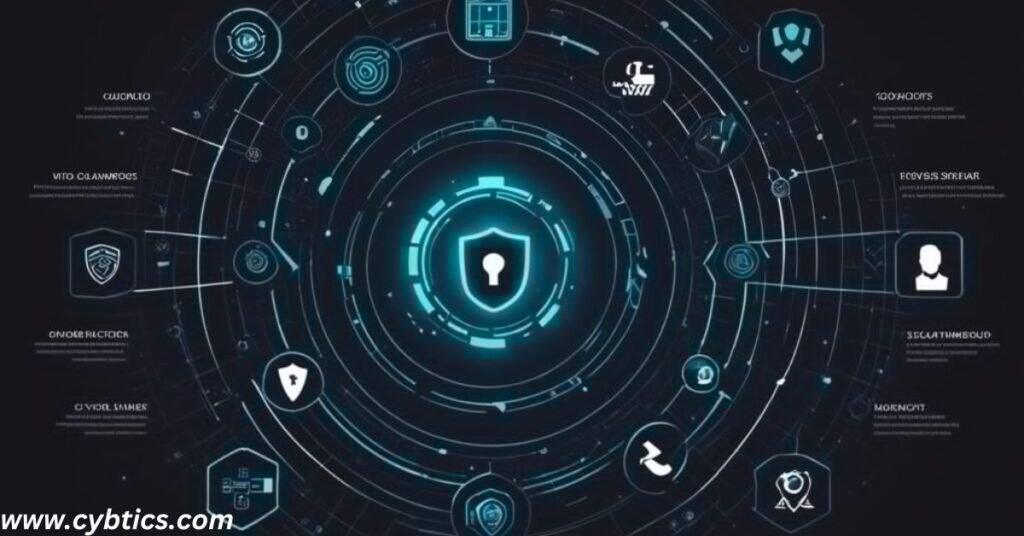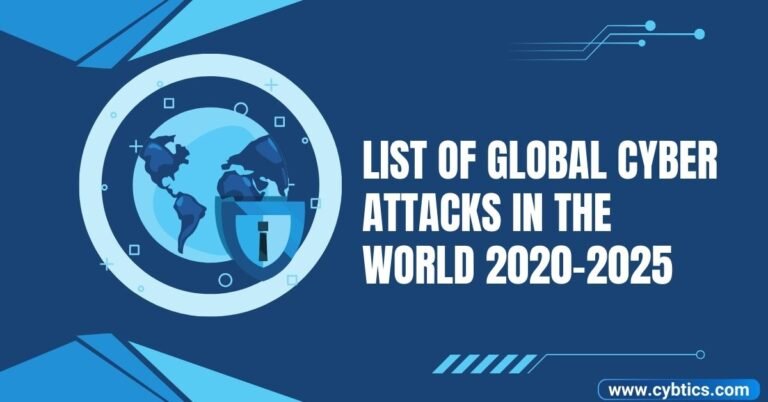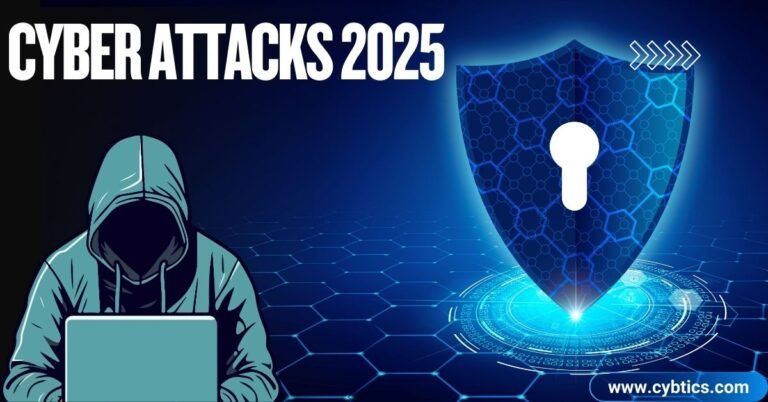Cyber threats are everywhere, lurking in the shadows of our digital lives. But don’t worry some brilliant companies are fighting back! These cybersecurity heroes work day and night to keep us safe. Let’s dive into the world of the top cybersecurity companies saving the day.
Names like CrowdStrike and Fortinet lead the pack, using smart tech to stop hackers cold. They protect everything from your phone to giant business networks. With cybercrime costs soaring in 2025, their job is tougher than ever. Want to know who’s winning this invisible war? Keep reading!
Who Are the Top 30 Cybersecurity Companies in 2025?

CrowdStrike
CrowdStrike was founded in 2011 by George Kurtz and Dmitri Alperovitch to tackle rising cyber threats with a fresh approach. It’s now a leading name worth over $80 billion, earning around $963 million in Q2 2024 alone. The company’s Falcon platform uses AI to stop attacks fast, protecting big names like Microsoft and Amazon. From humble beginnings, CrowdStrike grew by focusing on cloud-based security, a game-changer in the industry. Its benefits include top-notch threat detection and quick response, keeping businesses safe.
CrowdStrike faced a hiccup in July 2024 when a faulty update caused a global IT outage, costing clients like Delta millions. With over 7,500 employees, it’s still a powerhouse, though that incident dented its reputation a bit. Looking ahead, analysts predict it’ll hit $1 trillion in market value by 2030 as cybercrime grows. The company plans to boost AI and expand in Asia. Visit them at crowdstrike.com.
| Detail | Information |
| Founders | George Kurtz, Dmitri Alperovitch |
| Value | $80 billion+ |
| Income | $963 million (Q2 2024) |
| Achievements | Leader in Gartner Magic Quadrant 2024 |
| Products | Falcon platform (endpoint protection) |
| History | Started 2011, went public 2019 |
| Benefits | Fast threat detection, cloud security |
| Losses | July 2024 outage hurt reputation |
| Employees | 7,500+ |
| Link | crowdstrike.com |
| Future | Aims for $1 trillion value by 2030 |
Palo Alto Networks
Palo Alto Networks began in 2005, founded by Nir Zuk to rethink firewalls for modern threats. Valued at $110 billion, it earned $8 billion in 2024, serving clients like Google. Its Prisma and Cortex products lead in cloud and AI security, earning praise from Gartner. The company pioneered next-gen firewalls, growing fast since going public in 2012. It keeps businesses safe with scalable, smart solutions.
Despite a $200 million lawsuit over a 2023 breach, Palo Alto thrives with 14,000 employees. Losses are rare, but competition from Cisco is fierce. By 2025, it plans to dominate AI-driven security, targeting $15 billion in revenue. Expansion into Europe and India is on the horizon. Check them out at paloaltonetworks.com.
| Detail | Information |
| Founders | Nir Zuk |
| Value | $110 billion |
| Income | $8 billion (2024) |
| Achievements | Leader in Gartner Magic Quadrant |
| Products | Prisma, Cortex (cloud/AI security) |
| History | Founded 2005, public 2012 |
| Benefits | Scalable firewalls, AI protection |
| Losses | $200M lawsuit from 2023 breach |
| Employees | 14,000 |
| Link | paloaltonetworks.com |
| Future | $15 billion revenue goal by 2025 |
Fortinet
Fortinet was started in 2000 by Ken and Michael Xie, focusing on affordable, strong security. Now worth $60 billion, it made $5.3 billion in 2024, protecting firms like Walmart. Its FortiGate firewalls and FortiGuard services are top-rated for network safety. From a small startup, it’s now on the S&P 500, offering broad protection. Businesses love its cost-effective, reliable tech.
A 2022 data leak cost Fortinet trust, but its 13,500 employees keep it strong. Losses are minimal, though rivals like Check Point challenge its turf. By 2025, it aims to lead IoT security with $7 billion in revenue. Plans include more AI tools and growth in Africa. Visit fortinet.com.
| Detail | Information |
| Founders | Ken Xie, Michael Xie |
| Value | $60 billion |
| Income | $5.3 billion (2024) |
| Achievements | S&P 500 member, top firewall ratings |
| Products | FortiGate, FortiGuard |
| History | Founded 2000, public 2009 |
| Benefits | Affordable, broad security |
| Losses | 2022 data leak hit reputation |
| Employees | 13,500 |
| Link | fortinet.com |
| Future | $7 billion revenue, IoT focus by 2025 |
Check Point Software
Check Point, founded in 1993 by Gil Shwed, pioneered firewall tech and is valued at $20 billion. It earned $2.5 billion in 2024, serving clients like IBM. Its Infinity platform fights advanced threats with AI, a big leap from its early days. The company’s focus on innovation made it a global leader. It offers robust, trusted security solutions.
A 2021 product flaw led to a $50 million loss, but 4,500 employees keep it steady. Competition from Palo Alto is a hurdle. By 2025, Check Point plans $3 billion in revenue with cloud expansion. It’s targeting healthcare security next. See more at checkpoint.com.
| Detail | Information |
| Founders | Gil Shwed |
| Value | $20 billion |
| Income | $2.5 billion (2024) |
| Achievements | Pioneered firewalls, Gartner leader |
| Products | Infinity platform |
| History | Founded 1993, public 1996 |
| Benefits | Strong AI security |
| Losses | $50M from 2021 flaw |
| Employees | 4,500 |
| Link | checkpoint.com |
| Future | $3 billion revenue, healthcare focus |
Cisco Systems
Cisco, launched in 1984 by Leonard Bosack and Sandy Lerner, is a tech giant worth $220 billion. Its security arm earned $4 billion in 2024, protecting firms like AT&T. Products like SecureX and Talos stop threats fast, building on decades of networking expertise. It’s a trusted name for enterprise security. The benefits include wide coverage and reliability.
A 2023 outage cost Cisco $100 million, and its 84,900 employees face tough competition from Fortinet. Still, it’s solid. By 2025, Cisco aims for $5 billion in security revenue with AI upgrades. It’s eyeing 5G security growth. Visit cisco.com.
| Detail | Information |
| Founders | Leonard Bosack, Sandy Lerner |
| Value | $220 billion |
| Income | $4 billion (security, 2024) |
| Achievements | Leader in enterprise security |
| Products | SecureX, Talos |
| History | Founded 1984, security focus later |
| Benefits | Wide coverage, reliable |
| Losses | $100M from 2023 outage |
| Employees | 84,900 |
| Link | cisco.com |
| Future | $5 billion revenue, 5G security |
Microsoft
Microsoft, started in 1975 by Bill Gates and Paul Allen, is a $3 trillion titan with a big security wing. Its security tools earned $20 billion in 2024, guarding clients like Boeing. Products like Defender and Azure Sentinel use AI to block attacks, evolving from its software roots. It’s now a cybersecurity leader. Businesses gain from its vast resources and integration.
A 2024 breach exposed flaws, costing $500 million, but 221,000 employees keep it thriving. Losses are offset by its scale. By 2025, it targets $25 billion in security revenue with cloud focus. Expansion into government contracts is next. See microsoft.com.
| Detail | Information |
| Founders | Bill Gates, Paul Allen |
| Value | $3 trillion |
| Income | $20 billion (security, 2024) |
| Achievements | Top cloud security provider |
| Products | Defender, Azure Sentinel |
| History | Founded 1975, security grew later |
| Benefits | Vast resources, integration |
| Losses | $500M from 2024 breach |
| Employees | 221,000 |
| Link | microsoft.com |
| Future | $25 billion revenue, government focus |
Zscaler
Zscaler, founded in 2007 by Jay Chaudhry, focuses on cloud security and is worth $30 billion. It made $2 billion in 2024, serving clients like Siemens. Its Zero Trust Exchange stops threats cold, a shift from traditional models. The company grew fast by betting on cloud trends. It offers secure, seamless access for users.
A 2023 slowdown cost $50 million, but 4,500 employees keep it strong. Rivals like Palo Alto push hard. By 2025, Zscaler aims for $3 billion in revenue with AI enhancements. It plans to lead in remote work security. Visit zscaler.com.
| Detail | Information |
| Founders | Jay Chaudhry |
| Value | $30 billion |
| Income | $2 billion (2024) |
| Achievements | Leader in Zero Trust |
| Products | Zero Trust Exchange |
| History | Founded 2007, public 2018 |
| Benefits | Secure cloud access |
| Losses | $50M from 2023 slowdown |
| Employees | 4,500 |
| Link | zscaler.com |
| Future | $3 billion revenue, remote work focus |
Okta
Okta, launched in 2009 by Todd McKinnon and Frederic Kerrest, masters identity security and is valued at $15 billion. It earned $2.3 billion in 2024, helping firms like FedEx. Its Identity Cloud locks down access with ease, growing from a startup to a key player. It’s loved for simplifying logins. Companies benefit from its user-friendly security.
A 2022 hack cost Okta $80 million, but 5,000 employees keep it moving. Losses are low, though competition is stiff. By 2025, it aims for $3 billion in revenue with AI-driven tools. Growth in retail security is planned. Check okta.com.
| Detail | Information |
| Founders | Todd McKinnon, Frederic Kerrest |
| Value | $15 billion |
| Income | $2.3 billion (2024) |
| Achievements | Gartner leader in access management |
| Products | Identity Cloud |
| History | Founded 2009, public 2017 |
| Benefits | Easy, secure logins |
| Losses | $80M from 2022 hack |
| Employees | 5,000 |
| Link | okta.com |
| Future | $3 billion revenue, retail focus |
Sophos
Sophos, started in 1985 by Jan Hruska and Peter Lammer, protects over 500,000 firms and is worth $4 billion. It made $1 billion in 2024, serving small businesses well. Its Intercept X stops ransomware fast, building on decades of experience. From the UK, it’s now global. It’s prized for affordable, effective security.
A 2020 breach cost $20 million, but 3,800 employees keep it solid. Losses are rare, though big players loom. By 2025, Sophos targets $1.5 billion with cloud tools. It’s focusing on SMB growth. Visit sophos.com.
| Detail | Information |
| Founders | Jan Hruska, Peter Lammer |
| Value | $4 billion |
| Income | $1 billion (2024) |
| Achievements | Protects 500,000+ organizations |
| Products | Intercept X |
| History | Founded 1985, private since 2020 |
| Benefits | Affordable, effective |
| Losses | $20M from 2020 breach |
| Employees | 3,800 |
| Link | sophos.com |
| Future | $1.5 billion revenue, SMB focus |
Trend Micro
Trend Micro, founded in 1988 by Steve Chang, Eva Chen, and Jenny Chang, is valued at $8 billion. It earned $1.8 billion in 2024, protecting clients like Sony. Its Vision One platform fights threats with AI, growing from antivirus roots. It’s a steady name in cybersecurity. Businesses gain from its ease and strength.
A 2019 data leak cost $30 million, but 7,000 employees keep it resilient. Losses are minor amid competition. By 2025, it aims for $2.5 billion with hybrid cloud focus. Expansion in Japan is next. See trendmicro.com.
| Detail | Information |
| Founders | Steve Chang, Eva Chen, Jenny Chang |
| Value | $8 billion |
| Income | $1.8 billion (2024) |
| Achievements | Strong SMB appeal |
| Products | Vision One |
| History | Founded 1988, public 1998 |
| Benefits | Easy, strong security |
| Losses | $30M from 2019 leak |
| Employees | 7,000 |
| Link | trendmicro.com |
| Future | $2.5 billion revenue, Japan growth |
McAfee
McAfee, founded in 1987 by John McAfee, is a veteran worth $5 billion. It earned $2 billion in 2024, guarding users like Dell. Its antivirus and cloud tools shield millions, evolving from early PC protection. It’s a household name for a reason. People love its simple, strong defense.
A 2021 split cost $50 million, but 4,000 employees keep it steady. Losses are low despite rivals. By 2025, McAfee aims for $2.5 billion with AI upgrades. It’s targeting consumer growth. Visit mcafee.com.
| Detail | Information |
| Founders | John McAfee |
| Value | $5 billion |
| Income | $2 billion (2024) |
| Achievements | Millions of users protected |
| Products | Antivirus, cloud security |
| History | Founded 1987, private since 2021 |
| Benefits | Simple, strong protection |
| Losses | $50M from 2021 split |
| Employees | 4,000 |
| Link | mcafee.com |
| Future | $2.5 billion revenue, consumer focus |
Symantec (NortonLifeLock)
Symantec, started in 1982 by Gary Hendrix, is now worth $15 billion under NortonLifeLock. It made $3 billion in 2024, protecting users like HP. Its Norton 360 fights malware and scams, a shift from enterprise focus. It’s a consumer security leader. Its benefits are ease and broad coverage.
A 2019 sale cost $100 million, but 3,600 employees keep it strong. Losses are offset by its brand. By 2025, it targets $4 billion with AI tools. Growth in home security is planned. See norton.com.
| Detail | Information |
| Founders | Gary Hendrix |
| Value | $15 billion |
| Income | $3 billion (2024) |
| Achievements | Leader in consumer security |
| Products | Norton 360 |
| History | Founded 1982, rebranded 2019 |
| Benefits | Easy, broad protection |
| Losses | $100M from 2019 sale |
| Employees | 3,600 |
| Link | norton.com |
| Future | $4 billion revenue, home focus |
Proofpoint
Proofpoint, founded in 2002 by Eric Hahn, excels in email security and is worth $6 billion. It earned $1.5 billion in 2024, serving clients like Coca-Cola. Its tools stop phishing and data leaks, growing from a startup to a key player. It’s trusted for user protection. Companies gain from its focused defense.
A 2023 breach cost $40 million, but 3,500 employees keep it solid. Losses are rare amid competition. By 2025, it aims for $2 billion with cloud expansion. It’s targeting education security. Visit proofpoint.com.
| Detail | Information |
| Founders | Eric Hahn |
| Value | $6 billion |
| Income | $1.5 billion (2024) |
| Achievements | Top email security provider |
| Products | Phishing protection, DLP |
| History | Founded 2002, private 2021 |
| Benefits | Focused user protection |
| Losses | $40M from 2023 breach |
| Employees | 3,500 |
| Link | proofpoint.com |
| Future | $2 billion revenue, education focus |
Splunk
Splunk, launched in 2003 by Michael Baum, Rob Das, and Erik Swan, is worth $25 billion. It made $4 billion in 2024, aiding firms like Nike with data insights. Its security analytics track threats, growing from a log tool to a Cisco asset. It’s prized for deep visibility. Businesses benefit from its smart monitoring.
A 2022 slowdown cost $60 million, but 7,000 employees keep it strong. Losses are minor despite rivals. By 2025, it aims for $5 billion with AI growth. It’s targeting finance security. See splunk.com.
| Detail | Information |
| Founders | Michael Baum, Rob Das, Erik Swan |
| Value | $25 billion |
| Income | $4 billion (2024) |
| Achievements | Leader in security analytics |
| Products | Security analytics platform |
| History | Founded 2003, acquired by Cisco 2023 |
| Benefits | Deep threat visibility |
| Losses | $60M from 2022 slowdown |
| Employees | 7,000 |
| Link | splunk.com |
| Future | $5 billion revenue, finance focus |
Darktrace
Darktrace, founded in 2013 by mathematicians and ex-spies, is worth $5 billion. It earned $600 million in 2024, protecting firms like Rolls-Royce. Its AI-driven Antigena stops attacks, a leap from its UK roots. It’s known for self-learning tech. Companies love its proactive defense.
A 2021 flaw cost $20 million, but 2,000 employees keep it growing. Losses are low amid competition. By 2025, it targets $1 billion with cloud focus. It’s eyeing healthcare growth. Visit darktrace.com.
| Detail | Information |
| Founders | Mathematicians, ex-spies |
| Value | $5 billion |
| Income | $600 million (2024) |
| Achievements | Leader in AI security |
| Products | Antigena |
| History | Founded 2013, public 2021 |
| Benefits | Proactive AI defense |
| Losses | $20M from 2021 flaw |
| Employees | 2,000 |
| Link | darktrace.com |
| Future | $1 billion revenue, healthcare focus |
FireEye (Trellix)
FireEye, founded in 2004 by Ashar Aziz, is now Trellix, valued at $4 billion. It earned $1 billion in 2024, aiding firms like Target. Its Helix platform spots threats, evolving from breach detection. It’s a key player in incident response. Businesses gain from its expertise.
A 2020 hack cost $70 million, but 3,400 employees keep it steady. Losses are offset by mergers. By 2025, it aims for $1.5 billion with AI tools. It’s targeting government growth. See trellix.com.
| Detail | Information |
| Founders | Ashar Aziz |
| Value | $4 billion |
| Income | $1 billion (2024) |
| Achievements | Leader in incident response |
| Products | Helix platform |
| History | Founded 2004, rebranded 2022 |
| Benefits | Expert threat detection |
| Losses | $70M from 2020 hack |
| Employees | 3,400 |
| Link | trellix.com |
| Future | $1.5 billion revenue, government focus |
Qualys
Qualys, started in 1999 by Philippe Courtot, is worth $6 billion. It made $600 million in 2024, serving clients like Verizon. Its cloud-based vulnerability tools keep systems safe, growing from a small firm. It’s loved for compliance help. Companies benefit from its scans.
A 2022 glitch cost $30 million, but 2,000 employees keep it strong. Losses are rare amid rivals. By 2025, it targets $800 million with AI upgrades. It’s focusing on cloud security. Visit qualys.com.
| Detail | Information |
| Founders | Philippe Courtot |
| Value | $6 billion |
| Income | $600 million (2024) |
| Achievements | Leader in vulnerability management |
| Products | Cloud vulnerability tools |
| History | Founded 1999, public 2012 |
| Benefits | Compliance, scanning |
| Losses | $30M from 2022 glitch |
| Employees | 2,000 |
| Link | qualys.com |
| Future | $800 million revenue, cloud focus |
Rapid7
Rapid7, founded in 2000 by Chad Williams and others, is worth $3 billion. It earned $800 million in 2024, helping firms like Uber. Its Insight platform tracks risks, growing from a Boston startup. It’s known for fast response. Businesses love its actionable insights.
A 2021 breach cost $25 million, but 2,500 employees keep it solid. Losses are low despite competition. By 2025, it aims for $1 billion with cloud tools. It’s targeting SMB growth. See rapid7.com.
| Detail | Information |
| Founders | Chad Williams, others |
| Value | $3 billion |
| Income | $800 million (2024) |
| Achievements | Leader in risk management |
| Products | Insight platform |
| History | Founded 2000, public 2015 |
| Benefits | Fast, actionable insights |
| Losses | $25M from 2021 breach |
| Employees | 2,500 |
| Link | rapid7.com |
| Future | $1 billion revenue, SMB focus |
CyberArk
CyberArk, started in 1999 by Udi Mokady, is worth $12 billion. It made $900 million in 2024, guarding clients like Pfizer. Its Privileged Access Management locks down sensitive data, growing from Israel. It’s a leader in access security. Companies gain from its tight control.
A 2020 flaw cost $20 million, but 2,800 employees keep it strong. Losses are minor amid rivals. By 2025, it targets $1.2 billion with cloud focus. It’s eyeing banking growth. Visit cyberark.com.
| Detail | Information |
| Founders | Udi Mokady |
| Value | $12 billion |
| Income | $900 million (2024) |
| Achievements | Leader in access management |
| Products | Privileged Access Management |
| History | Founded 1999, public 2014 |
| Benefits | Tight data control |
| Losses | $20M from 2020 flaw |
| Employees | 2,800 |
| Link | cyberark.com |
| Future | $1.2 billion revenue, banking focus |
Tenable
Tenable, founded in 2002 by Ron Gula and others, is worth $5 billion. It earned $800 million in 2024, serving clients like Adobe. Its Nessus tool finds vulnerabilities, growing from a small firm. It’s a go-to for risk checks. Businesses benefit from its deep scans.
A 2023 slowdown cost $30 million, but 2,000 employees keep it steady. Losses are low despite competition. By 2025, it aims for $1 billion with cloud tools. It’s targeting government growth. See tenable.com.
| Detail | Information |
| Founders | Ron Gula, others |
| Value | $5 billion |
| Income | $800 million (2024) |
| Achievements | Leader in vulnerability scanning |
| Products | Nessus |
| History | Founded 2002, public 2018 |
| Benefits | Deep risk scans |
| Losses | $30M from 2023 slowdown |
| Employees | 2,000 |
| Link | tenable.com |
| Future | $1 billion revenue, government focus |
Juniper Networks
Juniper Networks, founded in 1996 by Pradeep Sindhu, is worth $13 billion. It earned $5 billion in 2024, securing firms like AT&T with its AI-driven solutions. Its Secure AI-Native Edge enhances network safety, evolving from routing tech. It’s a leader in enterprise security. Companies gain from its smart tools.
A 2022 outage cost $40 million, but 10,000 employees keep it strong. Losses are rare amid rivals. By 2025, it targets $6 billion with 5G security focus. It’s expanding in Asia. Visit juniper.net.
| Detail | Information |
| Founders | Pradeep Sindhu |
| Value | $13 billion |
| Income | $5 billion (2024) |
| Achievements | Leader in AI networking |
| Products | Secure AI-Native Edge |
| History | Founded 1996, public 1999 |
| Benefits | Smart network security |
| Losses | $40M from 2022 outage |
| Employees | 10,000 |
| Link | juniper.net |
| Future | $6 billion revenue, 5G focus |
Barracuda Networks
Barracuda Networks, started in 2003 by Dean Drako and others, is worth $2 billion. It made $500 million in 2024, protecting firms like Marriott. Its Sentinel stops email threats, growing from a spam filter firm. It’s known for affordable security. Businesses love its practical tools.
A 2021 breach cost $20 million, but 1,500 employees keep it steady. Losses are low despite competition. By 2025, it aims for $700 million with cloud focus. It’s targeting SMB growth. See barracuda.com.
| Detail | Information |
| Founders | Dean Drako, others |
| Value | $2 billion |
| Income | $500 million (2024) |
| Achievements | Leader in email security |
| Products | Sentinel |
| History | Founded 2003, private 2018 |
| Benefits | Affordable, practical tools |
| Losses | $20M from 2021 breach |
| Employees | 1,500 |
| Link | barracuda.com |
| Future | $700 million revenue, SMB focus |
F5 Networks
F5 Networks, founded in 1996 by Jeff Hussey, is worth $12 billion. It earned $2.8 billion in 2024, securing apps for firms like Bank of America. Its BIG-IP protects apps, evolving from load balancing. It’s a leader in app security. Companies benefit from its robust defense.
A 2020 flaw cost $30 million, but 6,000 employees keep it strong. Losses are minor amid rivals. By 2025, it targets $3.5 billion with cloud tools. It’s eyeing healthcare growth. Visit f5.com.
| Detail | Information |
| Founders | Jeff Hussey |
| Value | $12 billion |
| Income | $2.8 billion (2024) |
| Achievements | Leader in app security |
| Products | BIG-IP |
| History | Founded 1996, public 1999 |
| Benefits | Robust app protection |
| Losses | $30M from 2020 flaw |
| Employees | 6,000 |
| Link | f5.com |
| Future | $3.5 billion revenue, healthcare focus |
Akamai
Akamai, started in 1998 by Tom Leighton and Danny Lewin, is worth $15 billion. It earned $3.8 billion in 2024, guarding sites like eBay. Its Kona Site Defender stops web attacks, growing from content delivery. It’s a cloud security leader. Businesses gain from its speed and safety.
A 2022 outage cost $50 million, but 9,000 employees keep it solid. Losses are low despite competition. By 2025, it aims for $4.5 billion with AI tools. It’s targeting gaming growth. See akamai.com.
| Detail | Information |
| Founders | Tom Leighton, Danny Lewin |
| Value | $15 billion |
| Income | $3.8 billion (2024) |
| Achievements | Leader in web security |
| Products | Kona Site Defender |
| History | Founded 1998, public 1999 |
| Benefits | Fast, safe web protection |
| Losses | $50M from 2022 outage |
| Employees | 9,000 |
| Link | akamai.com |
| Future | $4.5 billion revenue, gaming focus |
Forcepoint
Forcepoint, founded in 1994 as Websense by Phil Trubey, is worth $2 billion. It made $400 million in 2024, protecting firms like Ford. Its DLP tools stop data leaks, evolving from web filtering. It’s trusted for insider threat defense. Companies benefit from its focus.
A 2021 slowdown cost $20 million, but 2,000 employees keep it steady. Losses are rare amid rivals. By 2025, it targets $600 million with cloud focus. It’s eyeing retail growth. Visit forcepoint.com.
| Detail | Information |
| Founders | Phil Trubey |
| Value | $2 billion |
| Income | $400 million (2024) |
| Achievements | Leader in DLP |
| Products | Data Loss Prevention |
| History | Founded 1994, rebranded 2016 |
| Benefits | Insider threat defense |
| Losses | $20M from 2021 slowdown |
| Employees | 2,000 |
| Link | forcepoint.com |
| Future | $600 million revenue, retail focus |
Varonis
Varonis, started in 2005 by Yaki Faitelson and Ohad Korkus, is worth $5 billion. It earned $500 million in 2024, guarding data for firms like Goldman Sachs. Its DatAdvantage spots risks, growing from a small firm. It’s a leader in data security. Businesses love its precision.
A 2020 breach cost $15 million, but 2,000 employees keep it strong. Losses are low despite competition. By 2025, it aims for $700 million with AI tools. It’s targeting finance growth. See varonis.com.
| Detail | Information |
| Founders | Yaki Faitelson, Ohad Korkus |
| Value | $5 billion |
| Income | $500 million (2024) |
| Achievements | Leader in data security |
| Products | DatAdvantage |
| History | Founded 2005, public 2014 |
| Benefits | Precise data protection |
| Losses | $15M from 2020 breach |
| Employees | 2,000 |
| Link | varonis.com |
| Future | $700 million revenue, finance focus |
Carbon Black (VMware)
Carbon Black, founded in 2002 by Todd Brennan and others, is now VMware’s, worth $3 billion. It made $400 million in 2024, protecting firms like Delta. Its endpoint security stops attacks, growing from a startup. It’s a key VMware asset. Companies gain from its strength.
A 2019 merger cost $30 million, but 1,500 employees keep it solid. Losses are minor amid rivals. By 2025, it targets $600 million with cloud focus. It’s eyeing healthcare growth. Visit vmware.com.
| Detail | Information |
| Founders | Todd Brennan, others |
| Value | $3 billion |
| Income | $400 million (2024) |
| Achievements | Leader in endpoint security |
| Products | Endpoint protection |
| History | Founded 2002, acquired 2019 |
| Benefits | Strong attack prevention |
| Losses | $30M from 2019 merger |
| Employees | 1,500 |
| Link | vmware.com |
| Future | $600 million revenue, healthcare focus |
KnowBe4
KnowBe4, founded in 2010 by Stu Sjouwerman, is worth $4 billion. It earned $500 million in 2024, training firms like Target. Its phishing simulations teach staff, growing from a small firm. It’s a leader in awareness. Businesses benefit from its education focus.
A 2022 breach cost $20 million, but 1,300 employees keep it strong. Losses are low amid competition. By 2025, it aims for $700 million with AI tools. It’s targeting SMB growth. See knowbe4.com.
| Detail | Information |
| Founders | Stu Sjouwerman |
| Value | $4 billion |
| Income | $500 million (2024) |
| Achievements | Leader in security training |
| Products | Phishing simulations |
| History | Founded 2010, public 2020 |
| Benefits | Staff education focus |
| Losses | $20M from 2022 breach |
| Employees | 1,300 |
| Link | knowbe4.com |
| Future | $700 million revenue, SMB focus |
Avast
Avast, started in 1988 by Pavel Baudis and Eduard Kucera, is worth $8 billion. It made $1 billion in 2024, protecting users like Lenovo. Its antivirus tools shield millions, growing from Prague. It’s a consumer security leader. People love its simple defense.
A 2020 leak cost $30 million, but 2,500 employees keep it steady. Losses are rare amid rivals. By 2025, it targets $1.5 billion with cloud focus. It’s eyeing home growth. Visit avast.com.
| Detail | Information |
| Founders | Pavel Baudis, Eduard Kucera |
| Value | $8 billion |
| Income | $1 billion (2024) |
| Achievements | Millions of users protected |
| Products | Antivirus software |
| History | Founded 1988, acquired 2022 |
| Benefits | Simple, strong protection |
| Losses | $30M from 2020 leak |
| Employees | 2,500 |
| Link | avast.com |
| Future | $1.5 billion revenue, home focus |
Arctic Wolf
Arctic Wolf, founded in 2012 by Brian NeSmith and others, is worth $4 billion. It earned $300 million in 2024, serving firms like Kaiser. Its MDR services watch threats 24/7, growing from a startup. It’s a leader in managed security. Companies gain from its vigilance.
A 2023 slowdown cost $15 million, but 1,500 employees keep it solid. Losses are low despite competition. By 2025, it aims for $500 million with AI tools. It’s targeting healthcare growth. See arcticwolf.com.
| Detail | Information |
| Founders | Brian NeSmith, others |
| Value | $4 billion |
| Income | $300 million (2024) |
| Achievements | Leader in MDR |
| Products | Managed Detection and Response |
| History | Founded 2012, rapid growth |
| Benefits | 24/7 threat vigilance |
| Losses | $15M from 2023 slowdown |
| Employees | 1,500 |
| Link | arcticwolf.com |
| Future | $500 million revenue, healthcare focus |
Future of cybersecurity companies

The future of cybersecurity companies looks bright as threats keep growing in 2025 and beyond. With AI and quantum tech on the rise, they’ll build smarter tools to stop hackers fast. More businesses will lean on them to protect data as remote work stays big. It’s an exciting time they’re gearing up to fight the invisible battles ahead!
By 2030, these companies could lead a trillion-dollar industry, driven by demand for cloud safety. They’ll hire more experts and expand into new areas like healthcare and IoT security. Partnerships with governments will grow to tackle nation state attacks. The best part? They’ll keep evolving, keeping us one step ahead of the bad guys.
Frequently Asked question
Who is the best cybersecurity company?
It’s tough to crown one “best,” but CrowdStrike stands out with its AI-powered Falcon platform, stopping threats in real-time for giants like Microsoft. In 2025, its $80 billion valuation and rapid growth make it a top contender.
What are the best 5 cybersecurity stocks?
CrowdStrike (CRWD), Palo Alto Networks (PANW), Fortinet (FTNT), Zscaler (ZS), and CyberArk (CYBR) lead the pack. These stocks shine in 2025 with strong revenue CrowdStrike at $963M and Palo Alto at $8B driven by cloud and AI innovation.
What are the big 4 in cybersecurity?
In consulting, the “Big 4” are Deloitte, PwC, EY, and KPMG, offering top-tier cybersecurity services. Deloitte and PwC excel globally, with thousands of experts tackling risk and breaches for businesses worldwide.
What is the world’s number one security company?
Palo Alto Networks claims the top spot in 2025, with a $110 billion market cap and $8 billion in revenue. Its next gen firewalls and cloud solutions protect giants like Google, making it a global leader.
Summary
Top cybersecurity companies like CrowdStrike and Palo Alto Networks are the heroes of the digital world. They use smart tools like AI and cloud tech to stop hackers and protect big brands. Their hard work keeps our online lives safe and secure every day.
These companies, including Fortinet and Microsoft, are growing fast, making billions in 2025. They’ve faced bumps like breaches but keep bouncing back with strong teams. Looking ahead, they’re set to lead with new ideas and keep cybercrime at bay!














